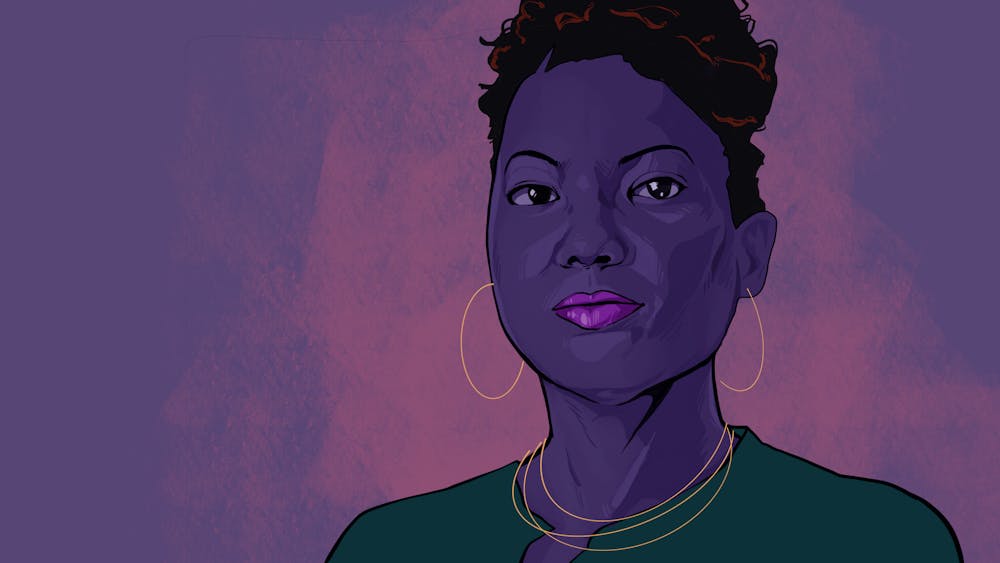After graduating from Penn with a degree in Economics, getting her Masters of Public Administration, and working in corporate America for years, Airea D. Matthews finally began to actualize her deep-seated passion for poetry. Looking back on her life, Matthews knew this love was always within her, from the book of 17th–century poems she used to peruse as a child to the Toni Morrison novels she read in college, all the way to the slam poems she performed at her friend’s café during graduate school. “You nurture your passions, you don’t have to force them,” she says. “The sweet entity that poetry is stayed there, even when I was ignoring it and didn’t know it was a big part of my life.” Now, as the newest Poet Laureate of Philadelphia, Matthews strives to spread her love of the art form to the city.
Matthews spent her 30s breaking down the craft of poetry, even returning to school to receive her Master of Fine Arts in the subject. “I didn't know what parataxis was or metonymy… I wanted to understand what I was writing,” she says. “Just like with music, you recognize that you need notes, and you need a scale, and you need an instrument. [School] was really understanding the tools to build a poem that would grow with me.”
For Matthews, the Poet Laureateship unifies her studies, both academic and personal–after reading, writing, teaching, interrogating, and sitting with poems for so long, Matthews couldn’t be more honored to serve as an ambassador for the art form. She views the civic position as a chance to give back not only to the Philly community, but to poetry as a craft that has fundamentally changed and defined her life.
As Poet Laureate, Matthews is responsible for reading poetry at events, writing occasional poems in response to major political events, and working on a personal project that serves the city in some manner. Her mission is to reconceptualize poetry as public art, building upon Philadelphia’s rich mural culture to create more opportunities for people to encounter literature in their day–to–day lives. By bringing poetry off the page, Matthews aspires to make the art form one that anyone can turn to for inspiration, encouragement, or solace just by looking down at the chalk on the sidewalk or looking at the side of a building while walking home from work.
In her own work, Matthews focuses on interrogation: asking and considering questions that may not have answers. She classifies these poems as the types “that register us as being vulnerable, open ourselves to the unknowable world around us, and make us okay with all that.” In her first book, titled Simulacra, Matthews focuses on inheritance. “What parts of our being, our landscape, our personality, and our public personas, are inherited things that we've learned from other people and have taken on?” she asks. “And to what degree is that authentic if it's not generated from the self and it's just a simulation of all of these things that we experience, these different people or expectations or inheritances we've received?” For her poetic discussion of these complex questions in her book and more, Matthews has been honored on multiple occasions, with one notable award being the 2016 Yale Series of Younger Poets prize. Judge Carl Phillips described Simulacra as “rollicking, destabilizing, at once intellectually sly and piercing and finally poignant.”
While she didn’t study creative writing at Penn, Matthews credits her university experience with much of her present day success. After transferring from NYU, Matthews lived in Du Bois College House, meeting countless friends who shared her same insatiable drive for knowledge. Now, Matthews says that seeing her son Westin (C '23) on the same campus she loved so much feels full–circle. In fact, it was Westin who pushed Matthews to apply for the Poet Laureate position after he was Philadelphia's 2018-2019 Youth Poet Laureate.
Course correction has defined Matthew's life as someone who switched schools and career paths, and it also defines the advice she gives to students. “Be open to the idea that what you came here for may not be what you want. And it’s okay,” she says. “Take the four years you have to learn yourself, to learn your strengths, to learn what gives you delight and joy, and to learn what makes you turn your head a bit so that you can know where your passions lie.” Matthews gives the following, aptly poetic reminder: “Build a life that in 20, 30 years you’ll be proud of.”

